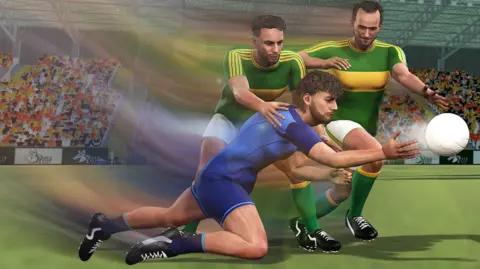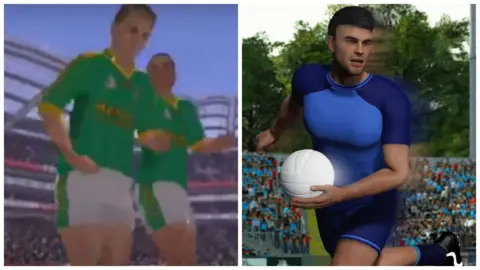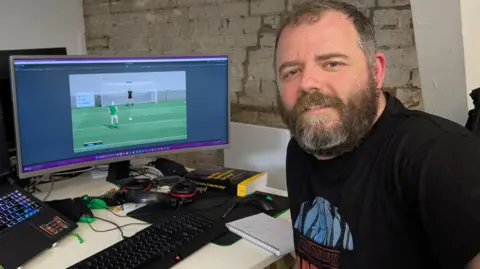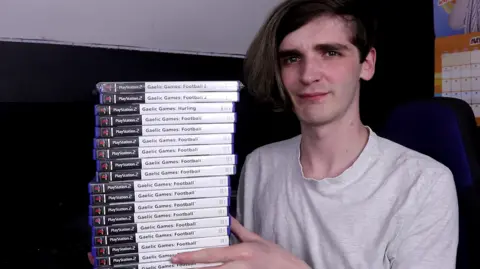Can Gaelic football finally have its video game hit?
 Buck Eejit Games
Buck Eejit GamesIt was 20 years ago that video-gaming Irish sports fans had their prayers answered.
Fifa, Pro Evolution Soccer, Madden NFL – back in 2005, these were the sports games dominating living rooms. Indeed, some still are today, helping to make the sports video game industry a £17bn-per-year behemoth.
But while most sports, from snooker to bizarre basketball superstar kung-fu tie-ins, had a title to offer, fans of Ireland's national sports - Gaelic football and hurling - had never seen their heroes in pixelated glory.
That is until Gaelic Games: Football dropped in November 2005.
The highly anticipated release, which saw eager gamers queued outside one store in Belfast, became one of Sony's biggest selling games in Ireland.
And, as was the pre-peak online gaming style at the time, those who wanted to beat their mates had to invite them over and gather around a defiantly non-flat screen TV.
One of those was Peadar McMahon, then a student in Belfast, who remembers "big sessions playing the game, having a laugh with friends".
The game was not well-received.
"Seriously flawed" declared the Sunday Times in a dismayed 3/10 review. "Devastatingly awful" condemned Irish culture website Joe.ie in a 2018 lookback piece.
Peadar is a little more diplomatic – "not a great game" he recalled – but he has reason for diplomacy since, poor or not, Gaelic Games: Football gave him an idea: What more could a game like this do?
The making of a Gaelic football video game
 Sony/Buck Eejit Games
Sony/Buck Eejit Games"I took the game as impetus to go and do something about it because I'm doing computer science, loved games from no age - and maybe I could do something?"
Two decades, one career in financial software and a £30k Kickstarter later, Belfast studio Buck Eejit Games, formed four years ago by Peadar, is set to be the first to dive back into the Gaelic games market since that ill-fated series.
Buck Eejit is one of about 40 firms active in Northern Ireland's burgeoning video games industry, a scene non-existent when Peadar graduated from Queen's University.
And the dozen-strong team - a tiny group compared to the huge numbers working at behemoths like EA – are in crunch time to get Gaelic Football '25 finished for a summer release: 16-hour days every day and not much time for anything else, including three kids in Peadar's case.
"It's a lot to undertake, you're putting a lot aside to get the game – the dream, the passion project – over the line," he said.
The scale of the challenge is not lost on him.

While the likes of football, F1 or golf can tap into a huge video gaming fan base, Gaelic games are niche sports – huge in Ireland but with a relatively limited global market.
In other words, a "risk", said Peadar, given the amount of hours and expense required to make a game.
It also means nailing the concept for both die-hard GAA fans and non-fans, said Úna-Minh Kavanagh, a video games producer with the Irish studio Gambrinous who has written extensively about games and the industry.
 Úna-Minh Kavanagh
Úna-Minh Kavanagh"For a global audience, it would be a 'new' sport for them to learn and jam with," she said.
"It could easily gain a following if key Irish influencers hop on board, and I think they may do because it's such an Irish thing – especially given the lacklustre response to the original game."
For her, the biggest failing of the original – and its sequel – was it didn't capture the "tribalism, excitement and thrill of being at a GAA match or even playing in one".
What went wrong for Gaelic Games: Football?
Created by defunct Australian studio IR Gurus, who used their pre-existing Australian Rules football game as a template, its development was beset by issues according to an oral history by Irish news site Journal.ie - a small team, working on a shoestring, recreating a sport they had no familiarity with.
The game did sell, but copies soon became a common sight in second-hand stores.
When Irish YouTuber PKMX, real name Matt Murphy, decided to review the game, he found copies so easy to find he now has what he believes is the world's biggest collection of the series - 18 copies, costing a grand total of €15 (£12.50).
"Put GAA in a video game, people are going to pick it up," he said. "But after people realised it was terrible, they (game copies) were everywhere."
PKMX's review of Gaelic Games: Football was not kind, but Matt has some sympathy for the "overworked and underfunded" studio behind it.
"They had their hands full. They'd never seen a match, had a tiny budget. It was never going to work out."
 Matt Murphy
Matt MurphyAs for the new effort, he can see some similarities between IR Gurus and Buck Eejit in terms of team size – but what the Belfast studio lacks in resources it can make up with passion and feel for the sport.
"They grew up with the GAA, they understand the thrill of the game.
"The pressure is on for players not to experience déjà vu – people don't want to be disappointed again."
That "cultural nuance" could be key, agrees Úna-Minh.
"There's something special knowing the team understands what GAA is all about. Whether it works out or not is another question, but it's a solid foundation."
So what does this solid foundation mean for Gaelic Football '25?
What features will Gaelic Football '25 include?
For one thing, Peadar said, with a laugh, of the team of 12 there's probably only a couple, including him, who grew up with the Gaelic games.
But they're keeping the focus on playability above all else.
That means some minor modifications to Gaelic football's basic rules – for instance players are allowed six steps when carrying the ball rather than the mandated four as it simply played better, said Peadar.
Meanwhile, sweeping new rules introduced in the sport won't be in the final game as they came in the middle of its development cycle.
A lack of resources also meant some tough choices.
There will be no online mode and, despite about 18 months of conversations with the Gaelic Games Association (GAA), no official licences meaning no real player names.
Inspired by Pro Evolution Soccer's approach in decades past, the game will instead feature extensive editing capabilities so players can change names and counties as much as they want.
Allow X content?
These decisions can be revisited via updates or, if things go well, sequels - in the meantime, said Peadar, the focus is on finishing the game for a summer release.
Is he feeling any pressure?
There's a lot riding on the team, he acknowledged, but if he's fazed by the prospect the game "gets panned and nobody buys it", it doesn't show.
Instead he seems like a man content that the best effort had gone towards making the best game the team could make.
Reaction at a playtest for punters at GamerFest Dublin in May garnered a positive response. And the finish line is in sight.
"We've been at this coming up to three years so it's about time we got this off our table and into people's hands."
And when they do, said Matt, people will definitely buy it - and maybe more.
"If it gets buzz on social media that it's actually good....then the sky's the limit."
